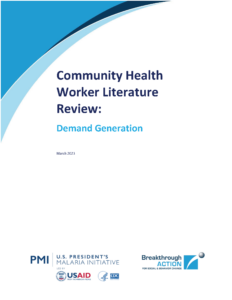To help ensure that community health workers (CHWs) are well equipped and that health systems work with them, Breakthrough ACTION conducted two literature reviews with support from the U.S. President’s Malaria Initiative: one on demand generation for CHW services and the other on CHW health system linkages.
Demand Generation
The key findings from this literature review include positive drivers and negative aspects that influence the demand for CHW services. Future approaches should leverage facilitators such as proximity to, familiarity with, and trust in CHWS and improve barriers such as stigma, lack of confidentiality, and lack of commodities. Interventions should focus on ensuring the positive drivers continue to improve the acceptance and utilization of CHW services while also addressing negative factors.
In addition, if CHWs are seen as less qualified providers who are outside the greater health system, efforts to integrate them into the health system should help communities see them as part of the overall system and help other providers at health facilities and health posts to see CHWs as an extension of themselves. This change in perception can improve communities’ acceptance of CHW services and improve CHWs’ motivation and performance.
Finally, when ramping up efforts to integrate CHWs into the overall health system, considerations must be taken in contexts where community members mistrust the health system. The literature in this review examined multiple interventions to strengthen CHW services, including adding information about health topics during CHW visits and improving client satisfaction, trust, and interest in utilizing CHWs. It is also important to ensure that CHWs are aware of how the community might perceive them based on how they communicate and interact with their clients. For this reason, CHWs must be well supported to continue to learn and practice compassion, empathy, and respect.
Health System Linkages
The results from the literature review support efforts to include CHWs as part of the overall health system, specifically regarding interventions related to stock management, referral procedures, data management, and supervision of CHWs. This literature review revealed that treating CHWs as integral actors of the overall health system is beneficial for relationships between CHWs and health facility staff and between CHWs and community members. Such connections enable CHWs to have greater social and structural support from the health system. Examples of such support include consistent supervision and stock management, referral, and data management systems to be shared between CHWs and health facility staff.
LEARN MORE
MORE INFORMATION


